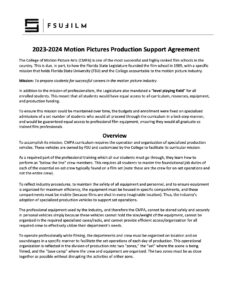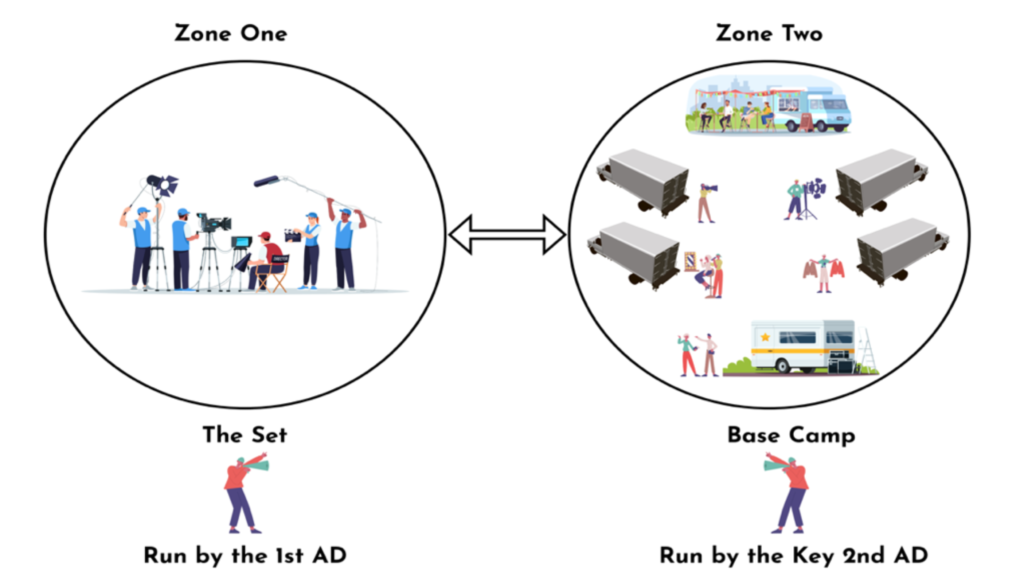
The College of Motion Picture Arts (CMPA) is one of the most successful and highly ranked film schools in the country. This is due, in part, to how the Florida State Legislature founded the film school in 1989, with a specific mission that holds Florida State University (FSU) and the College accountable to the motion picture industry.
Mission: To prepare students for successful careers in the motion picture industry.
In addition to the mission of professionalism, the Legislature also mandated a “level playing field” for all enrolled students. This meant that all students would have equal access to all curriculum, resources, equipment, and production funding.
To ensure this mission could be maintained over time, the budgets and enrollment were fixed on specialized admissions of a set number of students who would all proceed through the curriculum in a lock-step manner, and would be guaranteed equal access to professional film equipment, ensuring they would all graduate as trained film professionals.
Overview
To accomplish its mission, CMPA curriculum requires the operation and organization of specialized production vehicles. These vehicles are owned by FSU and customized by the College to facilitate its curricular mission.
As a required part of the professional training which all our students must go through, they learn how to perform as “below the line” crew members. This requires all students to master the foundational job duties of each of the essential on-set crew typically found on a film set (note these are the crew for on-set operations and not the entire crew).
To reflect industry procedures, to maintain the safety of all equipment and personnel, and to ensure equipment is organized for maximum efficiency, the equipment must be housed in specific compartments, and these compartments must be mobile (because films are shot in every imaginable location). Thus, the industry’s adoption of specialized production vehicles to support set operations.
The professional equipment used by the industry, and therefore the CMPA, cannot be stored safely and securely in personal vehicles simply because these vehicles cannot hold the size/weight of the equipment, cannot be organized in the required specialized cases/racks, and cannot provide efficient access/organization for all required crew to effectively utilize their department’s needs.
To operate professionally while filming, the departments and crew must be organized on location and on soundstages in a specific manner to facilitate the set operations of each day of production. This operational organization is reflected in the division of production into two “zones,” the “set” where the scene is being filmed, and the “base camp” where the crew and equipment are organized. The two zones must be as close together as possible without disrupting the activities of either zone.
Professional Film Set Operations

| Zone Managers | First Assistant Director – Zone One Key Second Assistant Director – Zone Two |
| Camera Department | First Assistant Camera Second Assistant Camera |
| Lighting Department | Chief Lighting Technician Assistant Chief Lighting Technician Key Electric |
| Grip Department | Key Grip Assistant Key Grip 3rd Grip |
| Sound Department | Field Sound Recordist Boom Operator |
Courses that require Set Operations
- M1 – FIL5459 – Practicum in Technical Support (Fall)
- M2 – FIL5459 – Practicum in Technical Support (Summer)
- MC – FIL5459 – Practicum in Technical Support (Spring)
- MC – FIL5977 – MFA Thesis Production (Spring)
- F3 – FIL3641L – Motion Picture Production Management (Spring)
- FC – FIL3971 – Thesis Film Support (Fall)
- FC – FIL4973 – BFA Thesis Production (Fall)
While all students are trained in the safe operation and use of production vehicles, not all can legally drive them or are otherwise able to do so. To facilitate its curriculum and a level playing field, the CMPA trains all students equally, and all students act as department heads and either drive the vehicle or, acting as safety assistants, ride as passengers. This ensures that every student completes the essential curriculum regardless of ability to drive, since driving is only a small portion of the Set Operations curriculum. In addition, the complexity of equipment and set operations differ between MFA and BFA programs; therefore, the work expectations are greater in the MFA professional conservatory and lessor in the BFA production major. Fleet Automobile Liability Coverage for production vehicles is provided by Florida State University through the Florida Department of Financial Services, Division of Risk Management.
Requirements and Qualifications
To achieve the training in these crew positions, all students are required to:
- master the fundamental requirements of each crew position,
- act within the hierarchy of these positions within their specific department,
- act within the hierarchy of the larger “set-operations,”
- safely operate all required equipment of each department,
- safely and efficiently access and maintain equipment on production vehicles,
- work effectively within the “base camp” of the productions,
- successfully complete the production vehicle operation workshop and exams,
- be enrolled in, or have successfully completed, the required coursework listed above,
- be in good professional standing as required by the CMPA professionalism code of conduct.
Terms of Appointment
The work outlined herein is required by students in the course of obtaining a degree and is performed under the supervision of FSU faculty and staff. Therefore, it is outside the scope of the Fair Labor Standards Act (FLSA). These appointments will be aligned with the semester begin/end dates. However, work will be done sporadically during the appointment period; the time commitment and demands of work will fluctuate and any required hours will vary from week to week as needed by projects in operation. In all circumstances, FSU will be in compliance with any/all applicable state and federal laws regarding work hours and wages.
Remuneration
- MFA students = $35.00 to be paid in a one-time payment at the end of each semester worked.
- BFA students = $25.00 to be paid in a one-time payment at the end of each semester worked.
Hours are variable by program, course, position and by production. Work is governed by the CMPA Federation of International Student Technicians (FIST) agreement.
Duration of Appointment
The MFA appointment is for the academic year and extends through Fall, Spring, and Summer.
The BFA appointment is for the academic year and extends through Fall and Spring.
